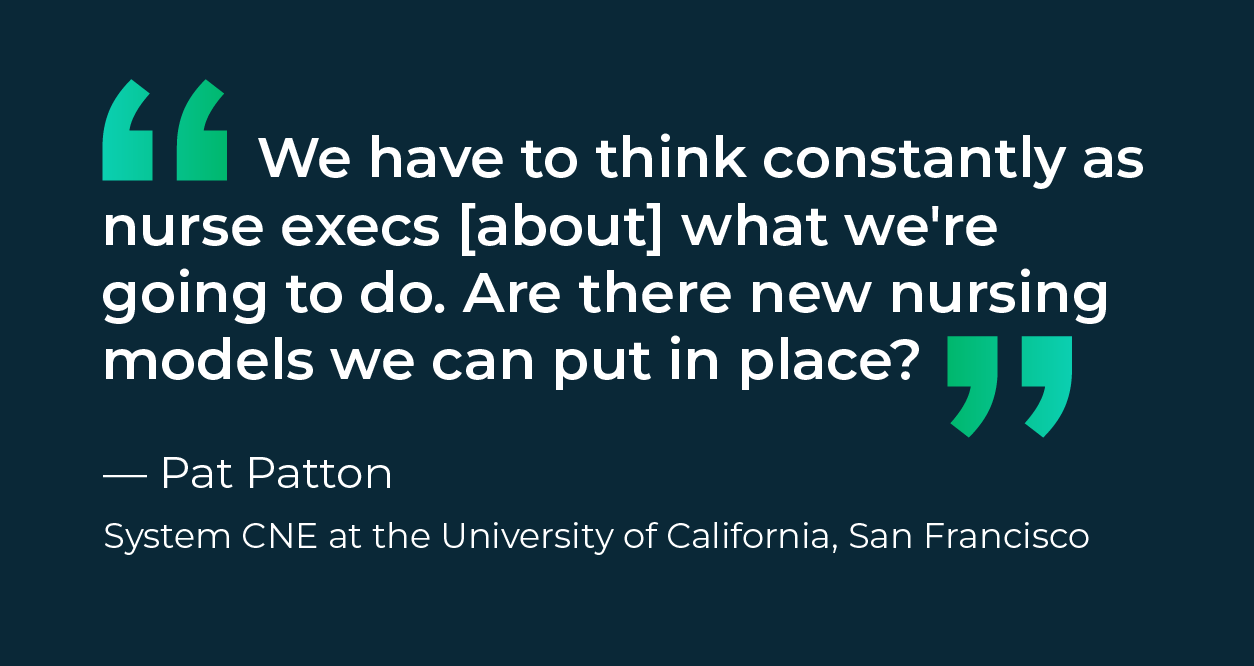CNO of the Future: The Transformation of Nursing Leadership

In post-pandemic times, burnout is a prevalent issue among nurses – and one that’s prompting many of them to search for work in different industries. These higher turnover rates are leading to strained budgets for health care executives as they fill staffing gaps with more costly temporary workers.
That’s one example of why nursing leaders equipped with the right skills to lead in difficult times are in high demand – and the role of the Chief Nursing Officer is changing along with the entire health care system.
Emeritus Healthcare brought together a panel of noted nursing experts for a fireside chat on the right training and skills for the next generation of nursing leadership and management to address the challenges the industry now faces. With the high retirement rates of senior nursing leaders, there’s a lot of opportunity for nurses to prepare themselves to take on leadership roles. And organizations can invest in upskilling current workers to help minimize turnover.
“The entire landscape of our profession has changed over the last couple of years,” said Dr. Jerry E. Spicer, Regional Chief Nurse Executive (CNE) at Kaiser Permanente. “And it really is demanding that, as nursing leaders, we recognize the fact that this landscape has changed and how do we best react to it?.”
Why Nursing Leadership Skills Are in High Demand
More than ever, nurses want to work closer to home, making it more challenging for management to attract and retain the necessary workforce. Plus, pressures from pandemic nursing have caused more experienced nurses to consider leaving the profession.
During 2021 alone, the RN workforce shrank by 100,000 nurses, which is hard to absorb when the need for nurses is only rising. The turnover rate has also increased by 8.4% in 2021, bringing the national average for nurse turnover to 27.1%. The financial implications add up quickly, as the average cost of turnover for a single staff nurse is $46,100. These days, recent graduates also have fewer on-the-job mentors to consult for guidance.

Nursing leadership needs to complement the clinical competencies from their frontline care experience with added business training. This ensures they can effectively lead change, advocate for their workforce, and manage health care systems’ financial priorities. Clinical knowledge is the foundation of a strong nursing leadership style. But the skills and tools of an executive must come into play to meet these challenges.
The Changing Role of CNOs: Strategies for Nursing Leadership
Understanding the challenges nurses face allows nursing leadership to think differently and respond to those changes accordingly.
We must “[rise] to the occasion as leaders to find out what brings a sense of belonging,” said Dr. Brooke Baldwin, CNE at the University of California, Irvine (UCI) Health. “How do we build that reconnection to what many of us came into health care to do—which is to care for people, to provide the best quality patient care?”
For nurses to thrive, managers must practice active listening and learn from frontline staff. Listening to the concerns of nurses in these positions allows managers to advocate to the C-suite for the tools and practices their staff needs to do their best work. Better supporting frontline employees can help nursing leadership develop structures and processes that set up their workforce for success.
“We have to think constantly as nurse execs [about] what we’re going to do. Are there new nursing models that we can put in place?’” said Pat Patton, System CNE at the University of California, San Francisco. “Virtual nursing has taken off now across the organization. How do we retain some of our senior nurses who could do that and work remotely, and take care of our patients because of their expertise and skills and knowledge? We don’t want that going out the door because it’s invaluable to those people.”
For other frontline nurses, allowing for greater flexibility in scheduling can bolster employee retention by creating an environment that’s responsive to all team members.
The Nursing Leadership Skills in Highest Demand
Nursing management must combine analytical and creative thinking with soft skills like empathy to engage nurses and interact with the C-suite effectively. Clinical competencies are part of the decision-making involved, but the abilities to build an argument and negotiate are critical skills that are heightened within the CNO role today as they navigate new challenges and demands.
When you are the CNO, you represent nursing in the C-suite, said host Ranil Herath, President of Emeritus Healthcare. Alongside other functional and operational executives in the C-suite, you have to frame nursing challenges and opportunities from the business, finance, and operational lenses – a critical skill. When you are a nurse manager, director, or team leader, you are making the case to other nurses, but this changes when you become the CNO.
It’s the CNO’s core duty to serve as the “voice of nurses” to other senior executives, with their clinical knowledge of nursing to back up any business case they make. Rather than seeing nursing as an expense, nursing leadership needs to understand – and be able to articulate – the revenue-generating aspects of nursing to other C-suite executives.
In today’s world, nursing administrators will lead a diverse workforce and must be adept at understanding and working with people from all demographics and nursing contexts, including nurses who work in widely varied healthcare settings.
Leading by Listening
People skills are core skills within nursing – and even more so for nursing leadership. During the recent fireside chat, the panel stressed the need for nursing leadership to use active listening and be nimble and agile. This is in part a response to changing needs and conditions within the nursing workforce during unusual periods like the pandemic and whatever future changes occur in health care.
As a nursing leader, you should quickly learn about each nursing team’s diverse responsibilities and perspectives. CNOs need to understand all the roles of their nursing staff—ER, OR, PICU, ambulatory, outpatient, inpatient, pediatric, adult, and psychiatric—and be open to learning from each specialty within the workforce.
The role of the CNO also requires merging relational competencies with a broad knowledge of the healthcare landscape. Nursing leadership is in an ideal position to listen to frontline nurses and C-suite concerns, helping both sides understand the other group’s issues and priorities. This is especially important as hospital beds fill up and challenges in all parts of the healthcare system persist.
Training for the Future of Nursing Leadership
As health care systems continue to face heightened challenges, nursing leadership becomes ever more essential. Leaders are a bridge between the care provided by nurses and the decisions that shape care delivery. One way to fast-track our next generation of nurse leaders is with flexible, team-based learning, where learners aren’t constrained by the limitations of geography and can still collaborate in real-time.
For example, the Chief Nursing Officer Program from the UCI Leadership Development Institute operates on a cohort-based learning model, with students working together in courses and eventually becoming part of a larger alumni network of peer support.
“We are providing an extremely unique form of education that takes the business acumen and makes it immediately applicable to people who need it now,” said Dr. Maritza Salazar Campo, faculty director for the UCI Leadership Development Institute’s CNO Program.
“If you want to be a cutting-edge executive in nursing, we’re going to help you do that fast—we’re going to fast-track you to that endpoint,” she adds. There are live remote experiences that happen in real-time as well as on-campus components to promote community and knowledge sharing. At the core of the program is applying business acumen to nursing leadership.
It’s these types of programs that offer a fast-track education for aspiring nursing leaders to upskill and move confidently toward the highest levels of management.
Building a Career Roadmap to Nursing Leadership
For many reasons – especially the high retirement rates of senior nursing executives – opportunities are plentiful in nursing leadership. Nurses considering moving into a management or C-suite role should consider their personal and professional goals to build a roadmap for their individual journey toward a career that will allow them to grow and develop their talents. At the same time, organizations might weigh enrolling existing staff in a nursing leadership program to boost employee retention by focusing on continuous learning and career pathing.
With the right mindset, a background in clinical skills, and a passion for nursing, aspiring leaders can acquire the training to move into positions where they can impact the future of the profession.
Learn more about the UCI Leadership Development Institute’s CNO program – a nine-month, immersive learning journey – or explore ways Emeritus Healthcare can upskill your team or organization through our learning solutions.















